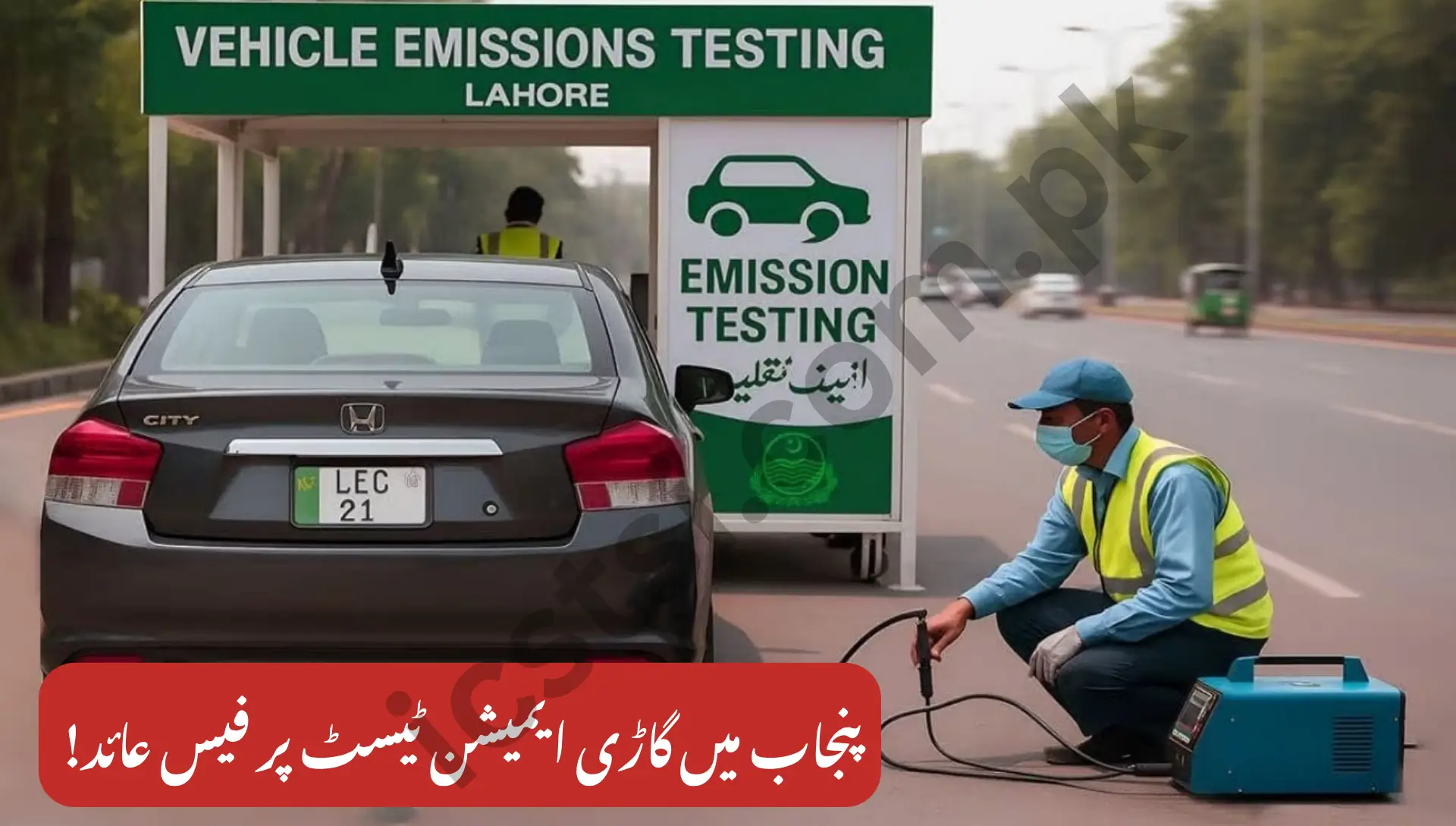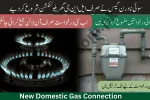Punjab Ends Free Vehicle Emission Testing Fees Imposed: What Vehicle Owners Must Know in 2025

Punjab Ends Free Vehicle Emission Testing Fees Imposed: What Vehicle Owners Must Know in 2025. The Punjab government has officially ended the facility of free vehicle emission testing, a move that directly affects all vehicle owners across the province. From now on, owners must pay fixed emission testing fees based on vehicle type and engine capacity. This policy, announced by the Environment Protection Department (EPD), aims to improve environmental accountability and streamline vehicle compliance. If you own a motorcycle, rickshaw, or car, here’s everything you need to know about the new charges, exemptions, and payment process in 2025.
Why Punjab Has Introduced Paid Vehicle Emission Testing
Vehicle emissions are one of the leading contributors to air pollution in Punjab, particularly in major cities like Lahore, Faisalabad, and Multan. The Environment Protection Department explained that moving away from free testing will:
- Encourage responsible vehicle ownership
- Improve air quality monitoring across urban and rural areas
- Generate funds for environmental initiatives
- Streamline operational efficiency at emission testing centers
This step aligns Punjab with global environmental standards, where most countries charge for vehicle emission testing to maintain sustainable air quality.
Fee Structure for Vehicle Emission Testing in Punjab (2025)
The government has fixed tiered fees based on vehicle type and engine capacity. Owners are required to deposit these fees directly into the EPA account at the time of testing. Below is a clear breakdown:
| Vehicle Type | Engine Capacity | Emission Testing Fee (Rs.) |
|---|---|---|
| Motorcycle | Any cc | 100 |
| Rickshaw (3-wheelers) | Any cc | 300 |
| Car | Up to 1000 cc | 500 |
| Car | 1001–1500 cc | 800 |
| Car | 1501–2500 cc | 1,000 |
| Car | 2501–4500 cc | 1,500 |
| Car | Above 4500 cc | 2,000 |
Tip: Always carry proof of payment when visiting a testing center to avoid complications.
Vehicles Exempted From Emission Tests
While most vehicles are now liable for the new charges, the Punjab government has identified certain exemptions. Vehicles exempted from emission testing include:
- Electric vehicles (EVs)
- Government-owned vehicles used for official purposes
- Diplomatic vehicles
- Vintage or classic cars registered before 1975 (limited exemptions apply)
Owners of exempted vehicles must still provide valid documentation to the testing authorities to confirm eligibility.
How to Pay Vehicle Emission Testing Fees
The payment process is straightforward but must be completed before or during testing:
- Visit the nearest EPA-approved testing center
- Present your vehicle registration documents
- Deposit the required fee into the EPA account
- Collect the official receipt, which serves as proof of compliance
Some centers may also allow digital payments, though physical deposits are currently standard across most urban centers.
Impact on Vehicle Owners
1. Financial Planning
For daily commuters, delivery drivers, and taxi owners, the new fees might feel like an additional financial burden. Motorcycle owners pay Rs. 100, which is minimal, but high-capacity car owners face Rs. 2,000 per test. Knowing this in advance allows owners to budget accordingly.
2. Compliance and Penalties
Non-compliance with emission testing can lead to fines, vehicle impoundment, or registration issues. Therefore, it is crucial for vehicle owners to:
- Schedule tests promptly
- Pay the prescribed fees
- Maintain proof of payment
3. Environmental Responsibility
Paid testing encourages greater accountability. Vehicle owners are now more conscious of maintaining engine efficiency and emission standards, which ultimately reduces air pollution.
Step-by-Step Guide to Emission Testing
- Check your vehicle type and engine capacity to determine the applicable fee
- Locate your nearest EPA-approved testing center using official Punjab government resources
- Prepare vehicle documents including registration, ID, and proof of ownership
- Deposit the fee directly at the center or approved account
- Undergo the emission test
- Receive the compliance certificate for future reference
Benefits of Paid Emission Testing
Paid testing may seem inconvenient initially, but it brings several long-term benefits:
- Better air quality: Systematic emission monitoring reduces harmful gases
- Revenue for environmental programs: Fees collected are reinvested
- Encourages vehicle maintenance: Owners monitor engines more frequently
- Aligns with international standards: Brings Punjab in line with other progressive regions
Comparison: Free vs Paid Vehicle Emission Testing
| Aspect | Free Testing (Old Policy) | Paid Testing (2025 Policy) |
|---|---|---|
| Cost | 0 Rs. | Fixed fees per vehicle type |
| Compliance Accountability | Low | High |
| Government Revenue | None | Direct revenue for EPD |
| Environmental Awareness | Minimal | Improved monitoring & awareness |
| Vehicle Owner Responsibility | Low | Encourages maintenance & compliance |
Expert Tips for Vehicle Owners
- Schedule in advance to avoid long queues
- Keep documentation ready: Registration card, ID, and previous compliance certificate
- Check for exemptions: Especially for EVs, diplomatic vehicles, or government vehicles
- Maintain your vehicle: Regular engine tuning reduces emissions and ensures passing the test
- Stay updated with EPA notifications: Fee structures or rules may change
FAQs
Q1: Are electric vehicles still exempt from emission testing in Punjab?
Yes, fully electric vehicles (EVs) are exempt from emission testing under the new 2025 policy. However, owners must provide proof of EV registration.
Q2: What happens if I fail to pay the emission testing fee?
Failure to pay may result in fines, non-renewal of vehicle registration, or vehicle impoundment.
Q3: How often should I get my vehicle tested?
Vehicles are usually tested once a year or as per specific EPA regulations. High-capacity vehicles may have additional testing frequency requirements.
Q4: Can I pay the fee online?
Some centers are piloting digital payment options, but most urban and rural centers currently require direct deposit at the testing center.
Q5: Are vintage or classic cars exempt from testing?
Certain vintage or classic vehicles registered before 1975 may be exempt, but approval from the EPD is required with proper documentation.
Conclusion
The end of free vehicle emission testing in Punjab signals a shift toward accountability and environmental responsibility. With fees now imposed for motorcycles, rickshaws, and cars, vehicle owners must budget accordingly and comply to avoid fines. Paying the prescribed charges ensures legal compliance, improved air quality, and smooth vehicle registration renewal. Stay proactive, check your vehicle’s eligibility, and schedule testing promptly.











